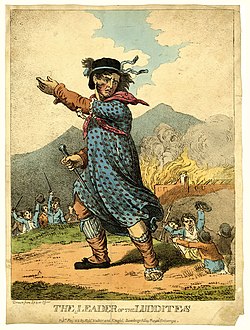Luddite
The Luddites were an early 19th century radical group which destroyed textile machinery as a form of protest.[1]

The group was protesting against the use of machinery in a "fraudulent and deceitful manner" to get around standard labour practices.[2] They were English textile workers who took an oath to resist machinery in the textile industry.
Luddites feared that the time spent learning the skills of their craft would go to waste as machines would replace their role in the industry. They were largely correct, but on the other hand, the textile industry grew to be a major exporter of cloth.[3] Parliament made "machine breaking" (industrial sabotage) a capital crime with the Frame Breaking Act of 1812 .
It is not quite right that Luddites protested against the machinery itself in an attempt to halt progress. However, over time, the term has come to mean one opposed to industrialisation, automation, or new technologies in general.[4]
The Luddite movement began in Nottingham and ended in a region-wide rebellion that lasted from 1811 to 1816. Mill and factory owners took to shooting protesters. Eventually the movement was suppressed with military force.
References
change- ↑ "A nod to Ned Ludd". Retrieved 6 November 2018.
- ↑ "What the Luddites really fought against". Retrieved 8 December 2016.
- ↑ "Who were the Luddites?". History.com. Retrieved 2016-12-12.
- ↑ "Luddite" Archived 2021-02-20 at the Wayback Machine Compact Oxford English Dictionary at AskOxford.com. Accessed February 22, 2010.